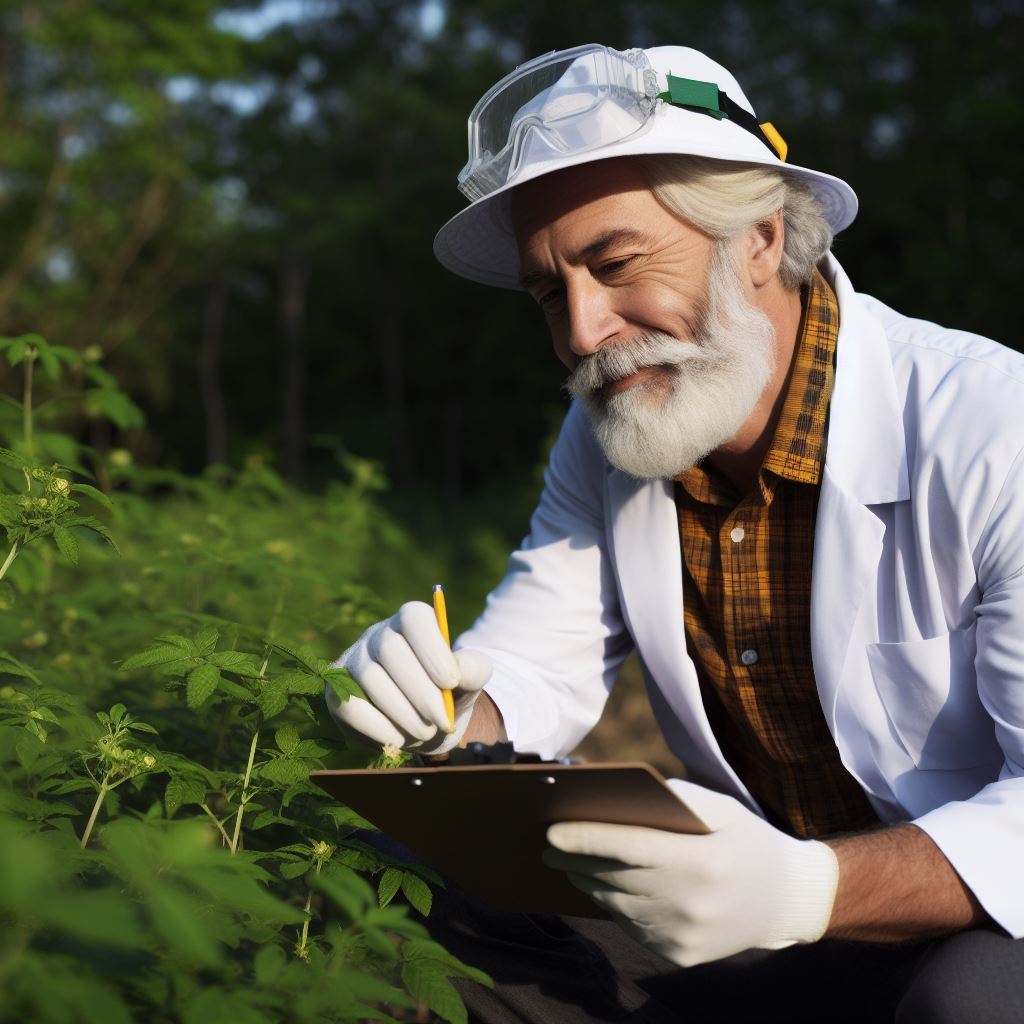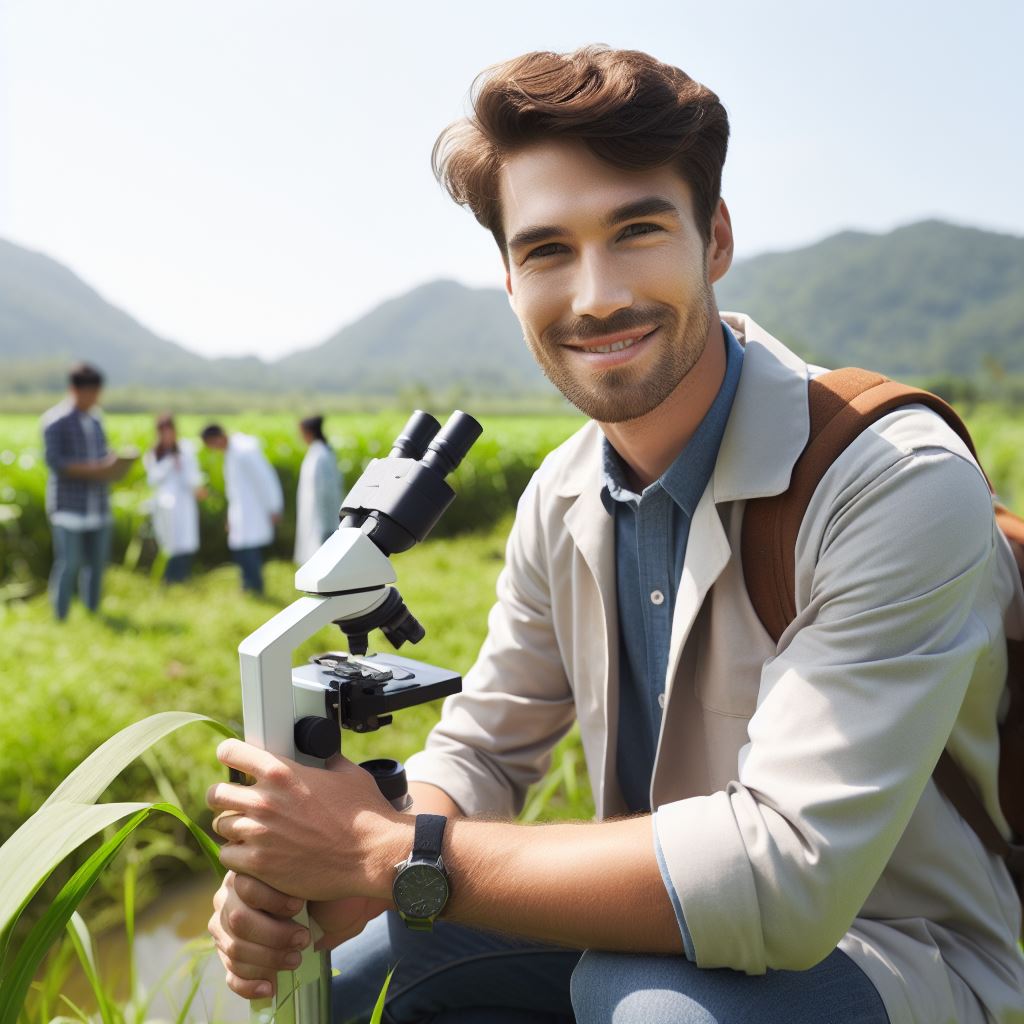Introduction
The importance of conferences and events for research scientists in the U.S
Conferences and events play a vital role in the professional development of research scientists in the United States.
These gatherings provide opportunities for knowledge exchange, networking, and staying updated with the latest advancements in their respective fields.
In this blog post, we will explore some key conferences and events that U.S. research scientists should prioritize attending to enhance their careers and contribute to the scientific community.
This blog post will discuss key conferences and events that U.S. research scientists should consider attending
Scientific conferences and events serve as platforms for researchers to present their work, gain feedback,
and collaborate with peers and experts. Attending these gatherings enables scientists to share their discoveries, exchange ideas, and receive constructive criticism, which fosters growth in their respective fields.
Additionally, conferences provide valuable networking opportunities, allowing researchers to connect with potential collaborators,
funding agencies, and industry professionals ‘ opening doors for future collaborations and career advancement.
Moreover, these events often feature renowned keynote speakers who share their expertise and insights,
inspiring attendees to explore new research directions and push boundaries in their own work.
By attending conferences and events, research scientists can stay abreast of the latest trends, methodologies,
and breakthroughs in their fields. These gatherings often offer educational workshops, panel discussions,
and poster sessions that allow scientists to delve deeper into specialized topics and gain actionable insights.
Furthermore, conferences also provide a platform for showcasing research achievements and receiving recognition,
which can significantly enhance a scientist’s professional reputation and visibility within the scientific community.
Basically, conferences and events are indispensable for U.S. research scientists. They provide avenues for knowledge sharing, networking, and staying up-to-date with the latest advancements in their fields.
By actively participating in these gatherings, research scientists can boost their careers, form valuable collaborations, and contribute to the overall scientific progress.
Benefits of attending conferences and events
- Networking opportunities with other scientists and researchers.
- Stay up-to-date with the latest advancements and research trends.
- Opportunities for collaborative research and partnerships.
- Career development and job opportunities.
Attending conferences and events as a research scientist offers numerous benefits that can greatly enhance your professional career.
These gatherings bring together like-minded individuals from various scientific fields, providing unique opportunities for networking, knowledge sharing, and collaboration.
this blog post, we will delve into the key advantages of attending conferences and events.
Networking opportunities with other scientists and researchers
Conferences and events are the perfect platforms to meet and connect with fellow scientists and researchers.
These gatherings bring together experts from diverse backgrounds and institutions, allowing you to expand your professional network.
Engaging in meaningful conversations and exchanging ideas with peers can lead to potential collaborations, mentorships, and friendships.
Stay up-to-date with the latest advancements and research trends
Conferences and events are hotspots for the latest discoveries, breakthroughs, and research trends in the scientific community.
You can attend these gatherings to explore cutting-edge research, listen to renowned scientists’ presentations, and join diverse scientific workshops.
Staying informed about the latest advancements is crucial for remaining competitive and relevant in your field.
Opportunities for collaborative research and partnerships
Conferences and events foster an environment conducive to collaboration and partnership building.
These gatherings bring together scientists and researchers who may have complementary expertise or research interests.
Engaging in discussions, sharing your own research, and attending sessions focused on collaboration can open doors to potential research projects and partnerships that can lead to groundbreaking discoveries.
Career development and job opportunities
Conferences and events provide a platform to showcase your work and expertise to a wide audience.
Presenting your research findings and participating in discussions can enhance your visibility in the scientific community and increase your chances of career progression.
Many conferences offer career fairs and job boards where you can explore job opportunities, connect with potential employers, and learn about the latest industry trends.
Attending conferences and events is a valuable investment in your professional growth.
These gatherings provide opportunities to expand your network, stay updated with the latest advancements, initiate collaborations, and explore career opportunities.
Make it a priority to attend conferences and events relevant to your field to reap the many benefits they offer.
Transform Your Career Today
Unlock a personalized career strategy that drives real results. Get tailored advice and a roadmap designed just for you.
Start NowMajor Conferences for U.S. Research Scientists
As a research scientist in the United States, attending key conferences and events is crucial to stay updated
on the latest developments in your field, network with peers, and present your own research.
In this section, we will explore three major conferences that are highly recommended for U.S. research scientists.
AAAS Annual Meeting
The AAAS Annual Meeting is one of the most prestigious gatherings for research scientists in the U.S.
The American Association for the Advancement of Science (AAAS) organizes this conference, uniting scientists, policymakers, educators, and journalists to discuss diverse scientific fields and share insights.
Key topics covered at the AAAS Annual Meeting span a broad range of scientific fields, including biology,
chemistry, physics, mathematics, and social sciences.
Past notable speakers at the conference include Nobel laureates, esteemed researchers, and influential
figures in science policy.
The AAAS Annual Meeting is vital for U.S. research scientists. It offers a platform to showcase work, collaborate, and gain exposure to cutting-edge research.
ACS National Meeting & Exposition
The ACS National Meeting & Exposition is a premier event for scientists specializing in chemistry-related
fields.
Organized by the American Chemical Society (ACS), this conference offers a diverse program that covers a
wide array of topics, such as organic and inorganic chemistry, biochemistry, and materials science.
Past notable speakers at the ACS National Meeting & Exposition include renowned chemists, industry leaders,
and experts in chemical research and development.
This conference is highly relevant for U.S. research scientists. It helps them stay updated, connect with potential collaborators, and explore career opportunities in the chemical sciences field.
AGU Fall Meeting
The AGU Fall Meeting is the largest gathering of Earth and space scientists in the world.
Organized by the American Geophysical Union (AGU), this conference encompasses a wide range of disciplines, including atmospheric sciences, geology, oceanography, and planetary sciences.
The AGU Fall Meeting features presentations, panel discussions, and poster sessions on key topics such as
climate change, natural hazards, and space exploration.
Throughout its history, the conference has hosted distinguished speakers from academia, government agencies, and research institutions, who have shared their expertise and insights with attendees.
For U.S. research scientists working in the Earth and space sciences, participating in the AGU Fall Meeting is
essential.
It provides a platform to present their findings, collaborate with colleagues from around the
world, and discuss pressing global challenges related to our planet and beyond.
U.S. research scientists have much to gain by attending major conferences like the AAAS Annual Meeting, ACS National Meeting & Exposition, and AGU Fall Meeting.
These events offer a plethora of opportunities to learn, network, and contribute to the advancement of scientific knowledge in their respective fields.
By actively engaging in these conferences, scientists can enhance their research, build professional
connections, and stay at the forefront of innovation.
Read: The Future Forecast: Research Scientist Roles in the U.S. by 2030
Regional conferences and events
When it comes to staying up-to-date in the field of research science, attending conferences and events is essential.
While major national and international conferences are well-known and widely attended, regional conferences and events also play a significant role in the advancement of niche research fields.
These gatherings provide researchers with the opportunity to share their work, learn from others, and build valuable connections within their specific area of study.
Examples of regional conferences and events
Regional conferences and events cater to scientists who specialize in specific geographic locations or research disciplines.
These gatherings are usually smaller in scale compared to their national or international counterparts, making them more intimate and conducive to networking and collaboration.
Regional conferences and events often focus on addressing challenges and exploring opportunities unique to specific regions or specific areas of research.
Showcase Your Business Today
Reach thousands of readers actively exploring professional services. Publish your business profile and grow your audience now.
Publish NowRegional conferences and events
There are numerous examples of regional conferences and events that cater to various research fields across the United States.
The Northeastern Association of Forensic Scientists Annual Meeting, for instance, brings together forensic scientists from the Northeast region to discuss advancements, challenges, and best practices in their field.
The Midwest Archaeological Conference focuses on archaeological research in the Midwestern United States.
Key topics covered
These regional conferences and events cover a wide range of topics, from healthcare and medicine to engineering and technology.
The New York Academy of Sciences Symposium on Stem Cells and Regenerative Medicine, for example, explores breakthroughs in stem cell research and its potential applications in regenerative medicine.
Such regional events provide a platform for experts to exchange knowledge, present their findings, and engage in meaningful discussions.
Target audience
The target audience for regional conferences and events is typically researchers, scholars, academics, and professionals in a specific field or geographic region.
These events are designed to facilitate networking and collaboration among individuals with similar research interests.
Attendees have the opportunity to meet experts in their field, forge connections, and potentially establish collaborations for future research endeavors.
Niche networking opportunities
Attending regional conferences and events offers several benefits for research scientists.
Firstly, these gatherings provide niche networking opportunities, allowing researchers to connect with peers and potential collaborators who share their research interests.
Secondly, the focused discussions on specific research areas enable participants to delve deep into their field of expertise and gain valuable insights from fellow researchers.
Lastly, presenting their work at regional conferences and events allows scientists to gain visibility, receive feedback, and stay informed about the latest advancements in their field.
Essentially, regional conferences and events are instrumental in promoting the growth and development of niche research fields.
They provide scientists with a platform to share their work, exchange knowledge, and establish valuable connections within their specific area of study.
By offering niche networking opportunities, focused discussions on specific research areas, and a chance to gain visibility, regional conferences and events play a vital role in advancing research science.
Read: Introduction to Environmental Science Careers in the USA

Gain More Insights: The Impact of Technology on the Chemist Profession in the US
Gain More Insights: Marine Biology Research on Endangered Species
Virtual conferences and online events
Virtual conferences and online events have become increasingly popular among U.S. research scientists, primarily due to the COVID-19 pandemic.
These types of events offer several advantages compared to traditional in-person conferences.
Advantages of Virtual Conferences
- Cost-effective: Virtual conferences eliminate travel and accommodation expenses, making them more affordable for scientists.
- Increased accessibility and flexibility: Attendees can join from anywhere in the world, enabling participation from individuals who might not have been able to attend in-person events.
- Reduced carbon footprint: With no need for travel, virtual conferences have a significantly lower environmental impact, contributing to sustainability efforts.
Given the benefits of virtual conferences and online events, many prominent gatherings are specifically tailored for U.S. research scientists.
Some notable examples include:
Popular Virtual Conferences and Online Events for U.S. Research Scientists
- AAAS Annual Meeting: This conference, organized by the American Association for the Advancement of Science, covers a broad range of disciplines.
- Golden Goose Award Ceremony: This event celebrates federally-funded research that has led to significant societal impact.
List of other virtual conferences:
- ASCB/EMBO Meeting: The American Society for Cell Biology and European Molecular Biology Organization jointly organize this gathering.
- Biotech Showcase: This event focuses on innovations and networking opportunities in the biotechnology field.
- NeurIPS: The Conference on Neural Information Processing Systems showcases cutting-edge research in machine learning and computational neuroscience.
- AGU Fall Meeting: Organized by the American Geophysical Union, this conference covers a wide range of Earth and space science topics.
- Leading scientific societies and organizations also frequently host virtual conferences, including the American Chemical Society, IEEE, and the National Academy of Sciences.
Overall, virtual conferences and online events have revolutionized the way research scientists in the United States engage with the scientific community.
These events offer a cost-effective, accessible, and environmentally-friendly alternative to traditional conferences.
With numerous notable gatherings tailored for U.S. research scientists, these events continue to facilitate knowledge sharing, collaboration, and professional development.
Read: Top U.S. Universities for Aspiring Environmental Scientists
See Related Content: Salary Ranges: What to Expect as a Physicist in the USA
Tips for attending conferences and events
Preparing for the event
- Research the conference agenda and speakers.
- Set clear objectives and goals for attending the event.
- Make travel and accommodation arrangements, if applicable.
Maximizing the conference experience
- Participate actively during sessions and engage with presenters and panelists.
- Utilize networking strategies to meet new contacts in your field.
- Take proper notes and organize information for future reference.
Following up after the event
- Connect with new contacts made during the conference.
- Share key takeaways and insights with your colleagues.
- Incorporate new knowledge gained into your ongoing research projects.
Attending conferences and events is an essential part of a research scientist’s professional development.
These gatherings provide valuable opportunities to stay updated on the latest advancements in your field, connect with experts and peers, and showcase your own work.
However, to make the most out of these events, it is crucial to be well-prepared and actively participate throughout.
Preparing for the event
Prior to attending a conference or event, conducting some research on the agenda and speakers is highly recommended.
This will help you identify sessions and talks that align with your research interests and goals.
Having clear objectives and goals in mind will allow you to make the most efficient use of your time during the conference.
If the event requires travel, it is essential to make all necessary arrangements well in advance. This includes booking flights or arranging transportation, as well as securing accommodation.
By taking care of these logistics beforehand, you can focus on the event itself.
Maximizing the conference experience
During the conference, it is vital to actively participate in sessions, workshops, and discussions. Be engaged and ask questions to gain a deeper understanding of the topics being presented.
This will not only maximize your learning experience but also help you connect with presenters and panelists.
Networking is an essential aspect of any conference. Prioritize making new contacts by attending social events, joining breakout sessions, and actively engaging in conversations.
Building a strong professional network can open doors to new collaborations and opportunities in your field.
While attending various sessions, taking proper notes is crucial. Jot down key points, interesting findings, and any questions you have.
Organize this information by categorizing it according to relevant research projects or topics. This will make it easier to review and incorporate into your work later on.
Following up after the event
After the conference, it is essential to follow up with the new contacts you made.
Connect with them on professional networking platforms and send personalized emails to express your gratitude for the connections made.
These relationships can provide valuable support and collaboration opportunities in the future.
Share the key takeaways and insights from the conference with your colleagues and peers.
This not only helps solidify your own understanding of the material but also contributes to the knowledge-sharing culture within your research community.
Incorporate the new knowledge gained into your ongoing research projects.
Apply the lessons learned, innovative approaches discovered, and new ideas acquired to further refine your work. This will enhance the quality and impact of your research.
Attending conferences and events is not only about gaining knowledge but also actively participating, networking, and sharing insights.
By following these tips, you will make the most out of your conference experiences and advance your career as a research scientist.
Read: Comparing Salaries: Environmental Scientists across U.S. States
Conclusion
Attending conferences and events is crucial for U.S. research scientists to stay updated and connected.
To recap, key points discussed in this blog post include the significance of networking, knowledge sharing, and collaboration opportunities provided by conferences and events.
It is essential for scientists to actively seek out and participate in relevant conferences and events.
By attending these gatherings, researchers can expand their professional network, gain exposure to new ideas, and present their work to a larger audience.
Conferences and events offer a platform to showcase research findings, receive valuable feedback, and establish potential collaborations.
Engaging in these activities not only benefits individual scientists but also contributes to the advancement of their field.
Therefore, I encourage all U.S. research scientists to make the most of these opportunities and actively participate in conferences and events.
By doing so, they can enhance their knowledge, establish connections, and contribute to the growth and progress of scientific research.
So, mark your calendars and start planning to attend the upcoming conferences and events relevant to your field!
[E-Books for Sale]
The Big Book of 500 High-Paying Jobs in America: Unlock Your Earning Potential
$19.99 • 500 High-Paying Jobs • 330 pages
Explore 500 high-paying jobs in America and learn how to boost your career, earn more, and achieve success!
See All 500 High-Paying Jobs of this E-Book
1001 Professions Without a Degree: High-Paying American Jobs You Can Start Now
$19.99 • 1001 Professions Without a Degree • 174 pages
Discover 1001 high-paying jobs without a degree! Unlock career tips, skills, and success strategies for just $19.99!




